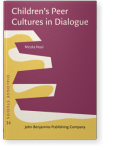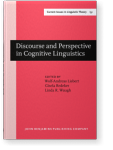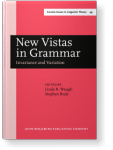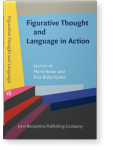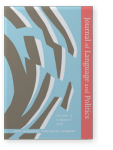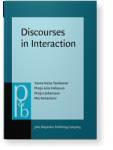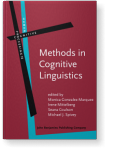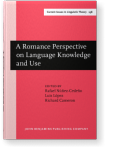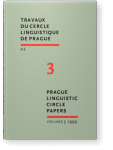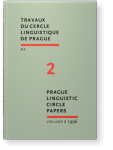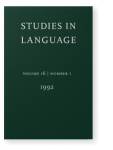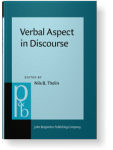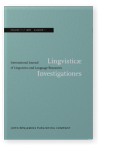Linda R. Waugh
List of John Benjamins publications for which Linda R. Waugh plays a role.
Book series
Titles
Discourse and Perspective in Cognitive Linguistics
Edited by Wolf-Andreas Liebert, Gisela Redeker and Linda R. Waugh
[Current Issues in Linguistic Theory, 151] 1997. xiv, 272 pp.
Subjects Cognition and language | Discourse studies | Pragmatics
New Vistas in Grammar: Invariance and Variation. Proceedings of the Second International Roman Jakobson Conference, New York University, Nov. 5–8, 1985
Edited by Linda R. Waugh and Stephen Rudy
[Current Issues in Linguistic Theory, 49] 1991. x, 540 pp.
Subjects Pragmatics | Syntax | Theoretical linguistics | Typology
2022 Metonymies of migration: Media discourse about and by migrants Figurative Thought and Language in Action, Brdar, Mario and Rita Brdar-Szabó (eds.), pp. 215–236 | Chapter
This chapter uses critical discourse studies (CDS) combined with metonymy/metaphor analysis to explore the difference between metonymies used to talk about migration/migrants in media discourse and those used by migrants themselves. Findings reveal differences between the way metonymies (and… read more
2010 Pronominal choice in French conversational interaction: Indices of national identity in identity acts Discourses in Interaction, Tanskanen, Sanna-Kaisa, Marja-Liisa Helasvuo, Marjut Johansson and Mia Raitaniemi (eds.), pp. 81–100 | Article
This paper examines how national identities are co-constructed and can be the site for struggle in interaction: in particular, how they are affected by general socio-cultural patterns and ideologies, the topics under consideration, and the positioning of the interactants. Through a fine-grained… read more
2007 They actually said that? An introduction to working with usage data through discourse and corpus analysis Methods in Cognitive Linguistics, Gonzalez-Marquez, Monica, Irene Mittelberg, Seana Coulson and Michael J. Spivey (eds.), pp. 19–52 | Article
2007 Multiple empirical approaches to a complex analysis of discourse Methods in Cognitive Linguistics, Gonzalez-Marquez, Monica, Irene Mittelberg, Seana Coulson and Michael J. Spivey (eds.), pp. 120–148 | Article
2003
The subject clitics of European Conversational French:
Morphologization, grammatical change, semantic change, and change
in progress
A Romance Perspective on Language Knowledge and Use: Selected papers from the 31st Linguistic Symposium on Romance Languages (LSRL), Chicago, 19–22 April 2001, Núñez-Cedeño, Rafael, Luis López and Richard Cameron (eds.), pp. 99–118 | Article1999 Roman Jakobsons Intellectual Influence in America Prague Linguistic Circle Papers: Travaux du cercle linguistique de Prague nouvelle série, Hajičová, Eva, Tomáš Hoskovec, Oldřich Leška †, Petr Sgall and Zdena Skoumalová (eds.), pp. 289–301 | Article
1997 Introduction Discourse and Perspective in Cognitive Linguistics, Liebert, Wolf-Andreas, Gisela Redeker and Linda R. Waugh (eds.), pp. ix–xiv | Miscellaneous
1996 Iconicity in the Lexicon: Its Relevance for Morphology and Its Relation to Semantics Prague Linguistic Circle Papers: Travaux du cercle linguistique de Prague nouvelle série, Hajičová, Eva, Oldřich Leška †, Petr Sgall and Zdena Skoumalová (eds.), pp. 251–284 | Article
1992 Review of Engel (1990): Tense and text: A study of French past tenses Studies in Language 16:1, pp. 192–201 | Review
1991 Invariance and markedness in grammatical categories New Vistas in Grammar: Invariance and Variation, Waugh, Linda R. and Stephen Rudy (eds.), pp. 221–238 | Article
1991 Introduction New Vistas in Grammar: Invariance and Variation, Waugh, Linda R. and Stephen Rudy (eds.), pp. 1–7 | Article
1991 Tense-aspect and hierarchy of meanings: pragmatic, textual, modal, discourse, expressive, referential New Vistas in Grammar: Invariance and Variation, Waugh, Linda R. and Stephen Rudy (eds.), pp. 241–259 | Article
1990 Discourse Functions of Tense-Aspect in French: Dynamic Synchrony Verbal Aspect in Discourse, Thelin, Nils B. (ed.), pp. 159–190 | Article
1987 Marking Time With The Passé Composé: Toward a Theory of the Perfect Lingvisticæ Investigationes 11:1, pp. 1–47 | Article
In this paper, it is claimed that PC is a unitary, but complex category. It is shown that in analyzing PC, four temporal elements must be used: the deictic zero point, the time of the auxiliary, the time of the participle, and the time of focus. Given these, there are two different formulations for… read more
